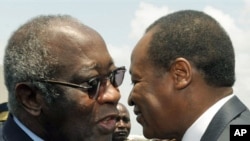Burkinabe President Blaise Compaore is in Ivory Coast for talks with government and opposition leaders about ways to resolve the country's political crisis. President Laurent Gbagbo dissolved the government and electoral commission weeks before expected presidential elections.
President Compaore is in Abidjan trying to resolve what he says is the crucial issue of delaying the presidential vote - the dissolution of the Ivory Coast electoral commission.
President Compaore says the appointment of an Independent Electoral Commission is essential to keep the process going forward.
President Compaore met Sunday with the two leading opposition candidates for president, former president Henri Konan Bedie and former prime minister Alassane Ouattara. Burkinabe Foreign Minister Alain Yoda read their joint communiqué.
They are calling for all parties to respect the Ouagadougou Accord that ended Ivory Coast's 2002-2003 civil war and to organize elections in the shortest possible time. They say there is need for an emergency meeting of all parties to resolve the political impasse.
President Compaore says such a meeting between Bedie, Ouattara, President Gbagbo and Prime Minister Guillaume Soro will take place sometime this week.
President Compaore says the Ouagadougou Accord not only specifies the appointment of President Gbabgo and Prime Minister Soro, but also includes other parties and the international community. He says he does not have a magic wand to solve the problem, but remains confident because he says all parties have shown their willingness to start again, and this is not the first time this process has faced problems.
The dissolution of the government and electoral commission would appear to mean the election will be delayed for the seventh time since President Gbagbo's mandate expired in 2005.
He sacked the Cabinet and electoral commission 10 days ago because he says more than 400,000 people were illegally registered to vote. The president's political opponents want an electoral commission in place before the new government is named.
They are calling for protests to continue until the crisis is resolved.
At least five people were killed and nine injured Friday in clashes between demonstrators and security forces in the president's home town. Thousands of protesters marched Saturday in the country's second-largest city of Bouake, where Prime Minister Soro's former rebel movement has strong support. Protesters in the northern city of Korhogo set fire to the headquarters of the ruling party. And there were additional protests reported Monday in the western city of Daloa.
U.N. Secretary General Ban Ki-moon has expressed deep concern about the deteriorating security situation in Ivory Coast and is urging all parties to refrain from any action or rhetoric that could result in more violence.
President Compaore is in Abidjan as the regional mediator for the Economic Community of West African States. Mahamane Toure is the group's Commissioner for Political Affairs.
"The final outcome is to the Ivorians themselves to agree on where they want to go," said Toure. "The international community can be next to them, can help them, give them financial support, give them equipment support, give them advice. But the ultimate decision will be in the hands of the stakeholders, President Gbagbo and the other opposition leaders, to come up with a solution," added Toure.
Prime Minister Soro's former rebel group, the New Forces, is warning that a failure to end the political impasse could lead to renewed conflict.
Regional Mediator Holds Crisis Talks in Ivory Coast











